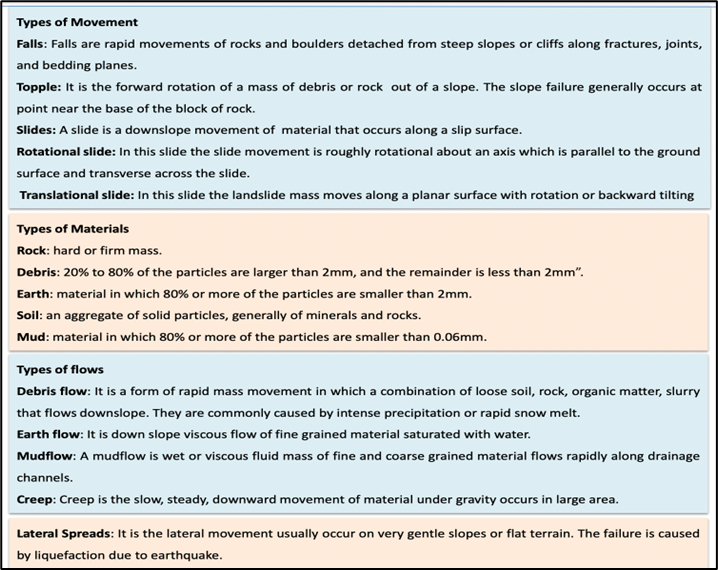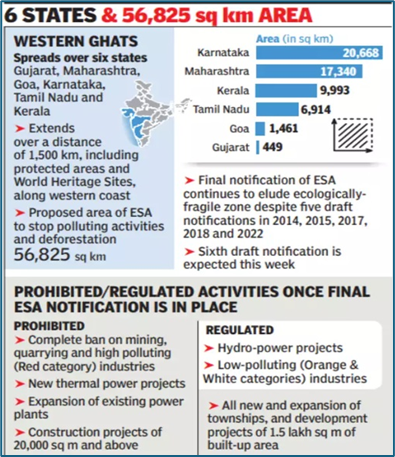Why in news?
At least 144 persons were killed and 197 injured after multiple landslides flattened some three villages in Vythiri taluk of the hilly Wayanad district of Kerala early on July 30.

What’s in today’s article?
- Landslide
- Landslide in Wayanad
Landslide and what Causes one?
- About
- A landslide is defined as the movement of a mass of rock, debris, or earth down a slope.
- Landslides are a type of "mass wasting," which denotes any down-slope movement of soil and rock under the direct influence of gravity.
- Landslides occur mainly in mountainous terrains where there are conducive conditions of soil, rock, geology and slope.
- Causes
- Natural Causes that trigger it include heavy rainfall, earthquakes, snow melting and undercutting of slopes due to flooding.
- Landslides can also be caused by Anthropogenic Activities such as excavation, cutting of hills and trees, excessive infrastructure development, and overgrazing by cattle.
- In India, rainfall-induced landslide events are more common.
Classification and mapping of Landslides

Landslide in Wayanad
- A massive landslide struck the hilly areas of Meppadi in Kerala's Wayanad district, killing at least 144 people.
- The tragedy occurred past midnight, with the first landslide hitting around 1 am and a second one following at 4:30 am.
Possible reasons behind Wayanad Landslide
- Heavy rainfall
- Extremely heavy rainfall, a fragile ecology particularly vulnerable to landslides, and steadily increasing population pressures all combined to trigger multiple landslides.
- The region received more than 140 mm of rainfall in the 24 hours between the mornings of Monday and Tuesday, about five times more than what is expected.
- Heavy rains during the monsoon season trigger landslides in Kerala almost every year.
- Hilly terrain with sharp slopes
- The whole of western Kerala, which is a hilly terrain with sharp slopes, is susceptible to landslides.
- According to the landslide atlas released by the Indian Space Research Organisation's (ISRO) National Remote Sensing Centre in 2023, 10 out of the 30 most landslide-prone districts in India were located in Kerala, with Wayanad ranked 13th.
- The terrain here has two distinctive layers, a layer of soil sitting atop hard rocks.
- When a lot of rain happens, the soil gets saturated with moisture and water reaches the rocks and flows between the soil and the rock layers.
- This weakens the force that binds the soil to the rocks and triggers the movement.
- Loss of green cover
- A 2021 study on landslide hotspots in India revealed that 59 per cent of the total landslides in Kerala occurred in plantation areas.
- Loss of forests increase the fragility of the terrain, especially in areas prone to heavy rains in the western ghats.
- Climate change
- Climate scientists have pointed towards the warming of the Arabian Sea as one of the causes for the extremely heavy and unpredictable rain patterns in the state.
- The southeast Arabian Sea is becoming warmer, causing the atmosphere above this region, including Kerala, to become thermodynamically unstable.
- Scientists have noticed a trend of deep cloud systems forming due to the warming of the Arabian sea.
- This causes extremely heavy spells of rain in shorter periods of time, increasing the risk of landslides, especially when these intrude into land.
- Environmental neglect and mining
- Since 2011, the "Western Ghats Ecology Expert Panel" set up by the government under ecologist Madhav Gadgil, has recommended that the Wayanad hill ranges be declared ecologically sensitive.
- The panel recommended that 75% of the 129,037 sq km area of the mountain range be declared ecologically sensitive because of the presence of dense forests, a large number of endemic species and unique geology.
- The panel also said that the region needed to be divided into zones based on their ecological sensitivity, where the most vulnerable sections needed to be monitored and protected him from rampant commercial activity.
- They recommended a ban on mining, quarrying, new thermal power plants, hydropower projects and large-scale wind energy projects in ecologically sensitive zone 1.
- The suggestions made by the panel have not been implemented even after 14 years due to resistance from state governments, industries and local communities.











